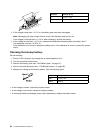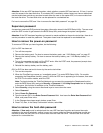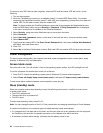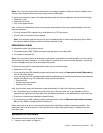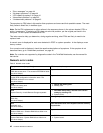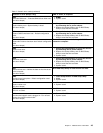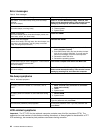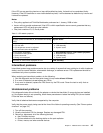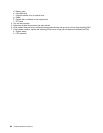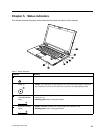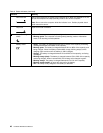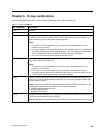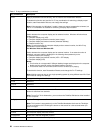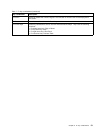
Error messages
Table 3. Error messages
Symptom or error (beeps, if any)
FRU or action, in sequence
Bad CRC2. Enter BIOS Setup Utility, and load Setup
defaults.
(two short beeps)
Press F1 to enter BIOS Setup Utility. Press F9, and
Enter to load the default setting. Then save the current
setting by pressing F10, and restart the computer.
Fan error.
(four short beeps, one long beep)
1. Fan.
2. Thermal grease.
3. System board.
DRAM is unplugged.
(four short beeps, pause, three short beeps, pause, one
short beep, pause, one short beep)
Install the DRAM.
DRAM is not well plugged.
(seven short beeps, one long beep, four short beeps, one
long beep, one short beep, one long beep, one short
beep, one long beep till forever.)
Reinstall the DRAM.
Operating system not found. 1. Check that the operating system has no failure
and is installed correctly.
2. Enter BIOS Setup Utility and see whether the hard
disk drive is properly identied. If you still see the
same error message, check the boot sequence.
3. Reinstall the hard disk drive.
4. Reinstall the operating system.
Unauthorized network card is plugged in - Power off and
remove the miniPCI network card.
(two short beeps)
Turn off the computer and remove the WAN card.
System Conguration Data Read Error
(two short beeps)
Press F1 to enter BIOS Setup Utility. Press F9, and
Enter to load the default setting. Then save the current
setting by pressing F10, and restart the computer.
No-beep symptoms
Table 4. No-beep symptoms
Symptom or error
FRU or action, in sequence
No beep, power-on indicator on, LCD blank, and no
POST.
1. Make sure that every connector is connected
tightly and correctly.
2. DIMM.
3. System board.
No beep, power-on indicator on, and LCD blank during
POST.
1. Reseat DIMM.
2. System board.
The power-on password prompt appears. A power-on password or a supervisor password is set.
Type the password and press Enter.
The hard-disk password prompt appears. A hard-disk password is set. Type the password and
press Enter.
LCD-related symptoms
Important: The TFT LCD for the notebook computer contains many thin-lm transistors (TFTs). The
presence of a small number of dots that are missing, discolored, or always lighted is characteristic of TFT
LCD technology, but excessive pixel problems can cause viewing concerns.
44 Hardware Maintenance Manual



